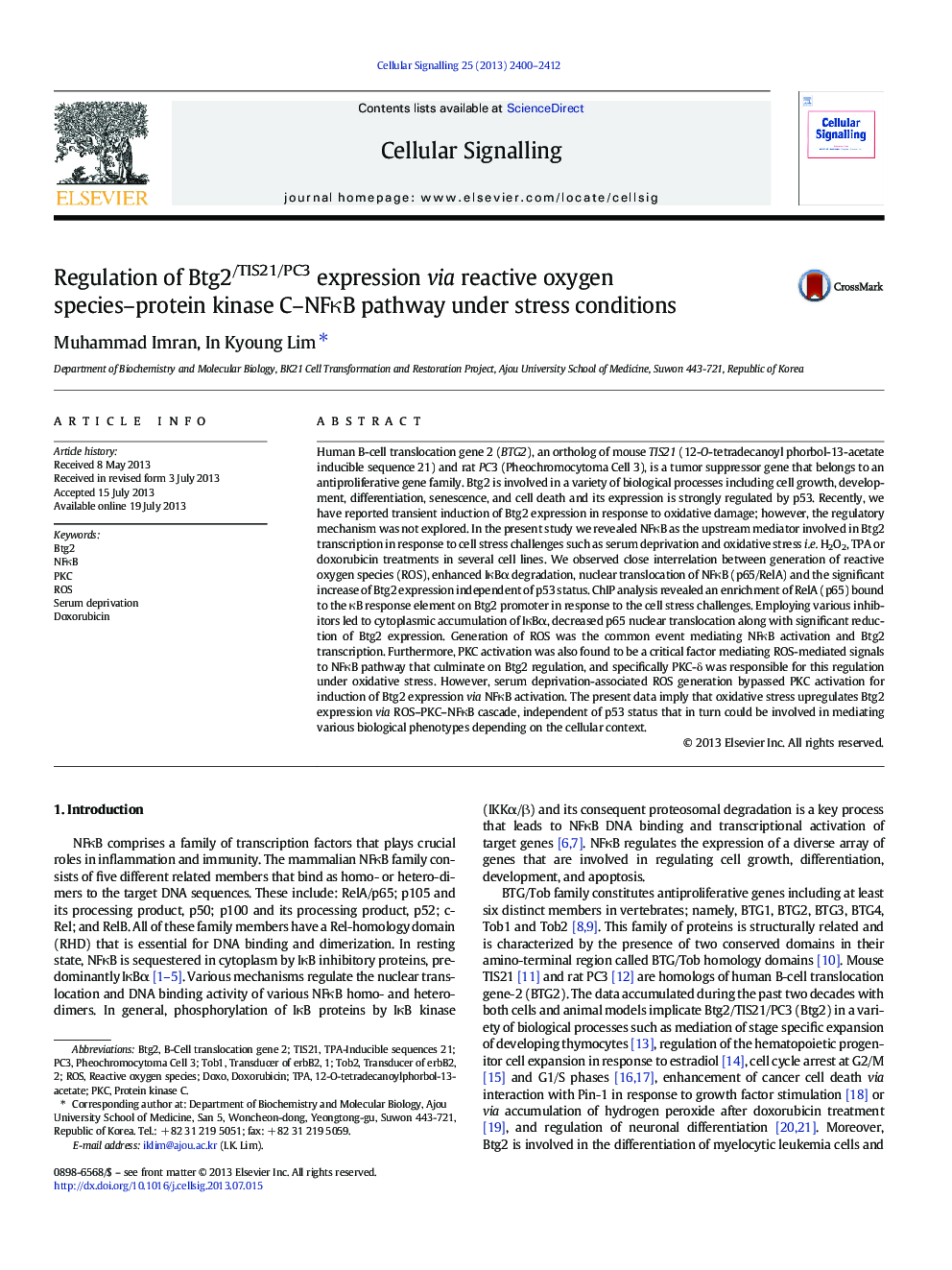| کد مقاله | کد نشریه | سال انتشار | مقاله انگلیسی | نسخه تمام متن |
|---|---|---|---|---|
| 10816114 | 1058543 | 2013 | 13 صفحه PDF | دانلود رایگان |
عنوان انگلیسی مقاله ISI
Regulation of Btg2/TIS21/PC3 expression via reactive oxygen species-protein kinase C-ÎFκΠpathway under stress conditions
دانلود مقاله + سفارش ترجمه
دانلود مقاله ISI انگلیسی
رایگان برای ایرانیان
کلمات کلیدی
موضوعات مرتبط
علوم زیستی و بیوفناوری
بیوشیمی، ژنتیک و زیست شناسی مولکولی
زیست شیمی
پیش نمایش صفحه اول مقاله

چکیده انگلیسی
Human B-cell translocation gene 2 (BTG2), an ortholog of mouse TIS21 (12-O-tetradecanoyl phorbol-13-acetate inducible sequence 21) and rat PC3 (Pheochromocytoma Cell 3), is a tumor suppressor gene that belongs to an antiproliferative gene family. Btg2 is involved in a variety of biological processes including cell growth, development, differentiation, senescence, and cell death and its expression is strongly regulated by p53. Recently, we have reported transient induction of Btg2 expression in response to oxidative damage; however, the regulatory mechanism was not explored. In the present study we revealed ÎFκΠas the upstream mediator involved in Btg2 transcription in response to cell stress challenges such as serum deprivation and oxidative stress i.e. H2O2, TPA or doxorubicin treatments in several cell lines. We observed close interrelation between generation of reactive oxygen species (ROS), enhanced IκBα degradation, nuclear translocation of ÎFκΠ(p65/RelA) and the significant increase of Btg2 expression independent of p53 status. ChIP analysis revealed an enrichment of RelA (p65) bound to the κB response element on Btg2 promoter in response to the cell stress challenges. Employing various inhibitors led to cytoplasmic accumulation of IκBα, decreased p65 nuclear translocation along with significant reduction of Btg2 expression. Generation of ROS was the common event mediating ÎFκΠactivation and Btg2 transcription. Furthermore, PKC activation was also found to be a critical factor mediating ROS-mediated signals to NFκB pathway that culminate on Btg2 regulation, and specifically PKC-δ was responsible for this regulation under oxidative stress. However, serum deprivation-associated ROS generation bypassed PKC activation for induction of Btg2 expression via NFκB activation. The present data imply that oxidative stress upregulates Btg2 expression via ROS-PKC-ÎFκΠcascade, independent of p53 status that in turn could be involved in mediating various biological phenotypes depending on the cellular context.
ناشر
Database: Elsevier - ScienceDirect (ساینس دایرکت)
Journal: Cellular Signalling - Volume 25, Issue 12, December 2013, Pages 2400-2412
Journal: Cellular Signalling - Volume 25, Issue 12, December 2013, Pages 2400-2412
نویسندگان
Muhammad Imran, In Kyoung Lim,